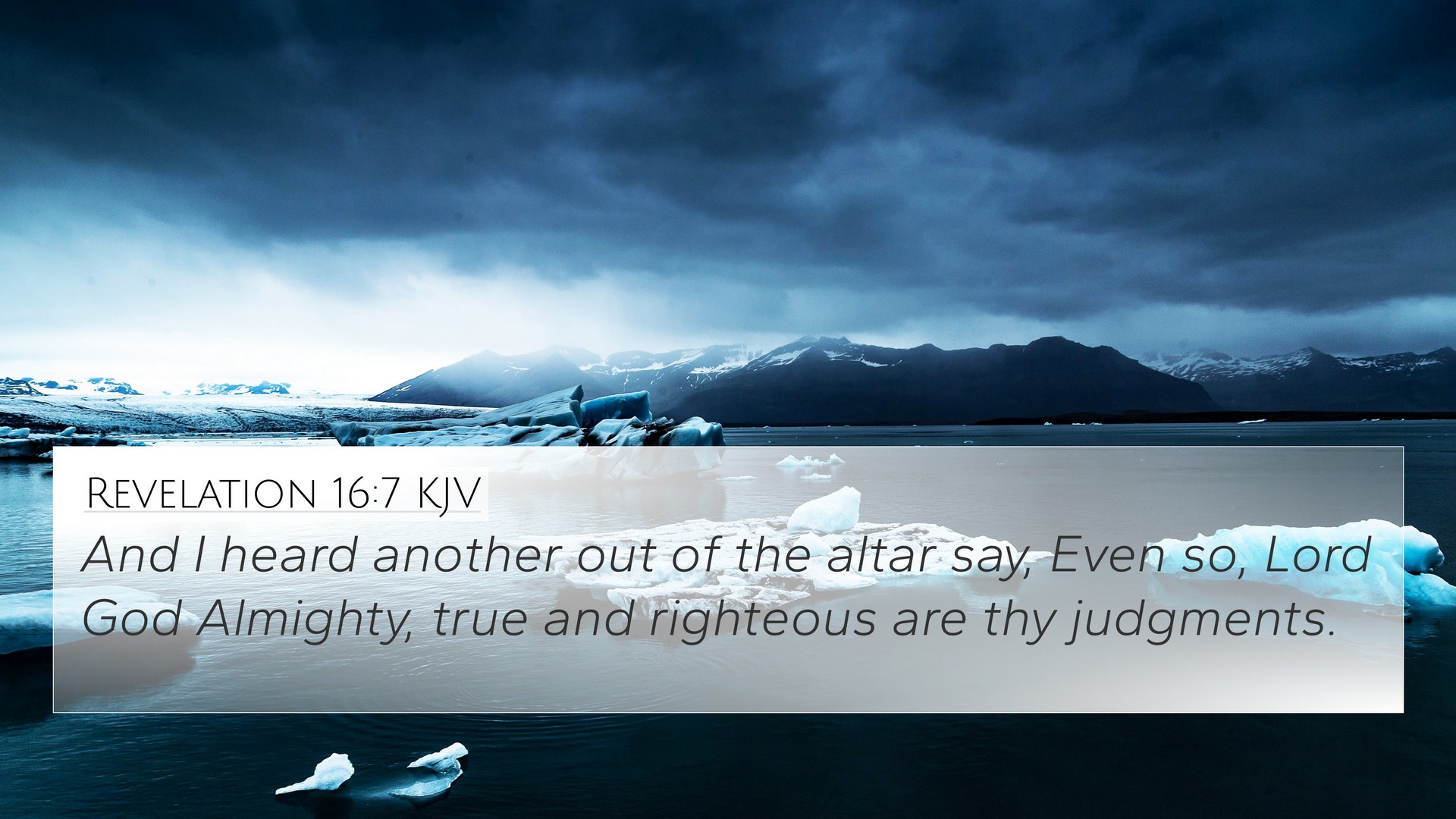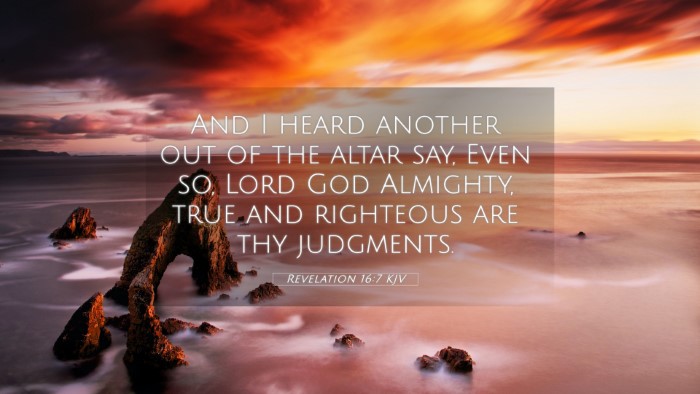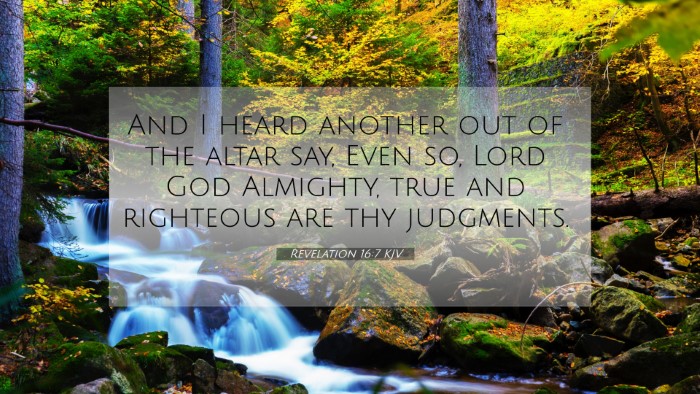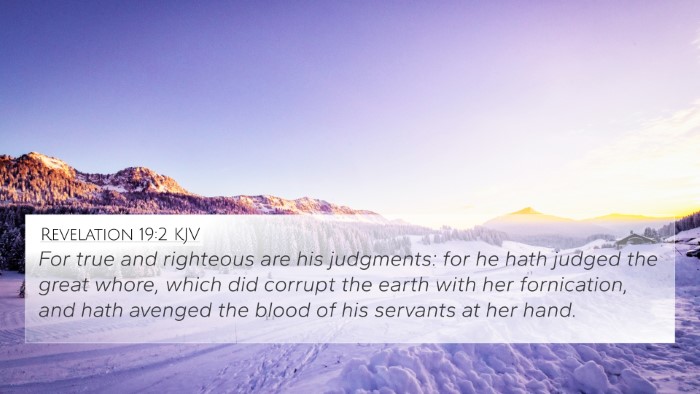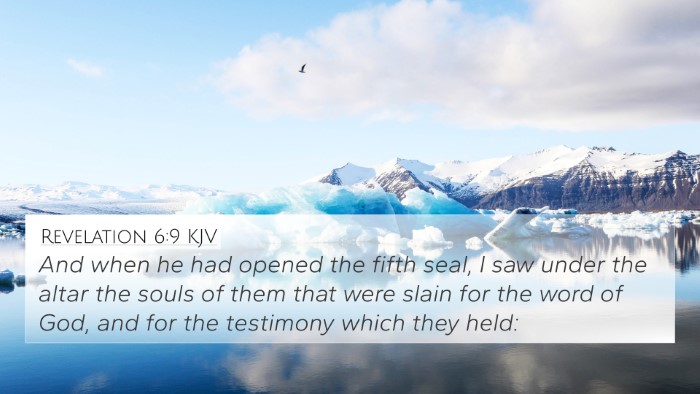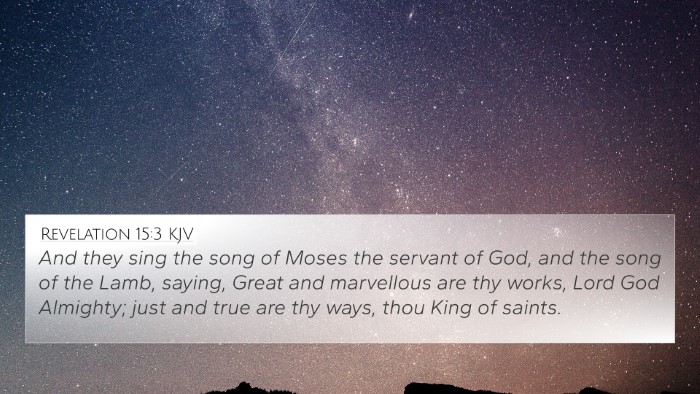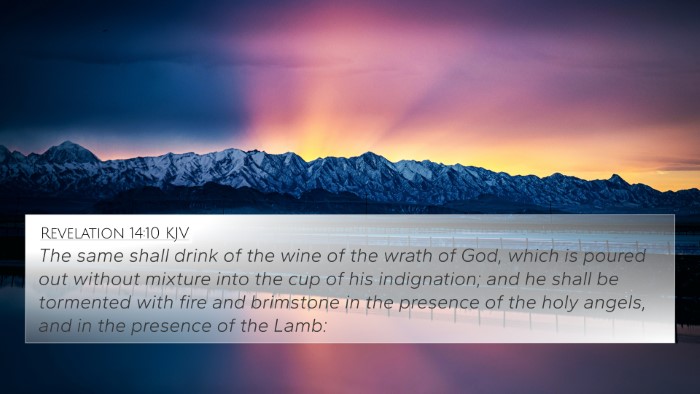Understanding Revelation 16:7
Verse: "And I heard another out of the altar say, Even so, Lord God Almighty, true and righteous are thy judgments." (Revelation 16:7)
Meaning and Interpretation
The verse under consideration, Revelation 16:7, calls attention to the judgments of God as true and righteous. This statement emerges from a heavenly altar, symbolizing the authority and sanctity of God's judgments. The phrase "Even so, Lord God Almighty" indicates the affirmation of God's justice and suggests a deep recognition of His holiness amidst the catastrophic events portrayed in the preceding chapters of Revelation.
Commentary Insights
Matthew Henry emphasizes the righteousness of God's judgments, noting that they are both deserved and meet His supreme standards of justice. He points to the holiness of God as the source of judgment, suggesting that the divine will is always in harmony with truth and justice.
Albert Barnes highlights the response from the altar, which represents the witness of the martyrs and the saints. This implies that cosmic justice aligns with the cry of the faithful. Barnes indicates that the judgments reveal not just the wrath of God, but also the ultimate triumph of good over evil. Moreover, he associates the judgments with God's overarching plan, reiterating the theme of justice throughout scripture.
Adam Clarke additionally elaborates on the concept of divine judgment, arguing that God’s authority is unparalleled, and this acknowledgment from the altar signifies a collective affirmation of God’s holiness. Clarke connects this passage with the larger narrative of retribution found throughout the Bible, encouraging believers to remain steadfast in their faith amidst trials.
Key Themes
- Divine Justice: The verse affirms that God’s judgments are not arbitrary; they are rooted in divine righteousness and truth.
- Affirmation of Faith: The mention of the altar underscores the unity of believers' voices in recognizing God’s authority.
- Holiness of God: Reinforces the idea that God’s nature is intertwined with His judgments; He cannot act contrary to His character.
- Prophetic Fulfillment: This statement serves as part of the prophetic message emphasizing accountability and the inevitability of divine retribution.
- Martyrdom and Justice: Reflects the voice of the martyrs who have suffered injustices, empowered by the hope of God’s ultimate vindication.
Cross-References
- Psalm 119:137 - "Righteous art thou, O Lord, and upright are thy judgments."
- Romans 2:6 - "Who will render to every man according to his deeds."
- Hebrews 10:30 - "For we know Him that hath said, Vengeance belongeth unto me, I will recompense, saith the Lord."
- 2 Thessalonians 1:5 - "Which is a manifest token of the righteous judgment of God."
- Revelation 15:3-4 - "Great and marvelous are thy works, Lord God Almighty; just and true are thy ways, thou King of saints."
- Isaiah 5:16 - "But the Lord of hosts shall be exalted in judgment, and God that is holy shall be sanctified in righteousness."
- Jeremiah 12:1 - "Righteous art thou, O Lord, when I plead with thee: yet let me talk with thee of thy judgments."
- Psalm 145:17 - "The Lord is righteous in all his ways, and holy in all his works."
- Matthew 12:36 - "But I say unto you, That every idle word that men shall speak, they shall give account thereof in the day of judgment."
- Proverbs 21:15 - "It is joy to the just to do judgment: but destruction shall be to the workers of iniquity."
Thematic Connections
This verse relates to several key themes that permeate throughout scripture. Some of these themes include:
- Justice and Mercy: The interplay of God's justice with His mercy is a recurring motif in the scriptures, reaffirmed here in Revelation as the faithful call upon God for righteous judgment.
- Faithfulness in Trials: The acknowledgment of divine righteousness provides comfort and strengthens the faith of believers facing persecution.
- Covenantal Faithfulness: God’s judgment is tied to His covenant promises, where He assures His people of their vindication in due time.
- Eschatological Hope: The affirmation of God's righteous judgments points towards the future restoration of His creation, emphasizing hope in the midst of chaos.
- Collective Worship and Response: The voice coming out of the altar symbolizes the united response of the church in worship and acknowledgment of divine justice.
Conclusion
Revelation 16:7 encapsulates a profound truth about the nature of God's judgments, affirming their truthfulness and righteousness. By integrating insights from renowned biblical commentators and cross-referencing related scriptures, we gain a deeper understanding of the complexities behind this verse. Collectively, these insights fortify the believer’s grasp of God’s ultimate justice and encourage steadfast faith in His holy nature.
Through careful Bible verse cross-references and detailed comparative Bible verse analysis, we can enhance our understanding of God's dealings across both Testaments, strengthening our faith and grounding our hope in the truth of His Word.
